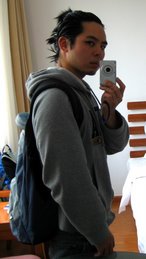I went to Home Depot recently and bought some shade-loving plants for the walkway, which rarely sees the sun. Not to be left out of the low-hanging fruit made possible by consumer research psychology, the garden department of Home Depot has a few botanically oriented "impulse buy" items near the cash register, one of which caught my eye: daffodil bulbs.
"How Wordsworthian!" I thought to myself. A bag of 40 bulbs regularly retails for the modest price of $6.95, but they reduced to $4.50! The little bulbs were like mini brown onions, their tiny blanched tips just peaking through in search of the sun. Knowing a bargain when I see one, I couldn't pass up what was clearly the destiny of my household,
"A host, of golden daffodils;We also have a very large, bare mound of dirt that for 20 years we have never planted; this would be the perfect spot. The tag indicated that one bag would plant six square feet. Without calculating the "daffodil-per-square-foot" density, I assumed that three bags would be enough for me to begin decorating the mound with bulbs; once those bulbs were secured, I could return and buy more bags to finish the job. I put the daffodil babies into my cart for adoption, and brought them to their new home.
Beside the lake, beneath the trees,
Fluttering and dancing in the breeze."
In reality, the daffodil bulb bag says nothing of how many square feet one bag will plant, and the mound might not receive enough sunlight to provide the optimal environment for the daffodils. So there I was, with over 120 bulbs (many of the bulbs had divided inside the bag). The sun-soaked front flower bed is completely saturated with daffodils, and a full two-thirds of the original brood are awaiting homes. Unable to bring myself to throw away those precious (yet relatively inexpensive) bulbs, I have decided I will plant them in the front and back yards of Uncle Bill's house.
All this reminded me of one of my favorite segments on NPR, which I heard on Christmas Day while driving from Brentwood to La Palma. It was titled "Finding Home: Fifty Years of International Adoption". As Christians, we often refer to our being adopted by God, but I'm not sure how familiar many of us are with the realities of adoption, in either the modern or biblical worlds.
This segment was phenomenal, and if you have 20 minutes to an hour, you will only be pleased at having invested the time to hear the stories therein contained. As a listener with a perspective informed by my status as God's adopted, I found many striking parallels with the way I perceive adoption, but one needn't be Christian to appreciate the narratives.
If you have an hour, the link to the full story is here. [Choose a story, and then you can listen via RealPlayer or maybe Windows Media.]
If you only have about 19 minutes, I found the portion titled "Korean Adoptees Remember" the most interesting.
Below are some excerpts from "Korean Adoptees Remember".
Jane Jeong Trenka is a Korean woman who was adopted by a white family in America. She was very bitter about having been taken from her culture and mother tongue, and no longer has contact with her adoptive parents. "Adoption is the only sort of practice in the world where you get separated from your parents, there's a permanent rupture between yourself and your culture, and you're suppose to be grateful."
Most of the adoptees, however, had sentiments very different from Trenka's. Susan Cox, another Korean adopted by an American family, recalls her first visit back to Korea, at the age of 24. She went to the Holt orphanage, from which she had been adopted. "It was filled with children who were waiting to be adopted. I also had the opportuniy to meet people who were my age, that for whatever reason had not been adopted--and they were still at the orphanage--and how different our lives were! And not because I had gone to America, but because I had gone to a family. I had married; I've had children; I've had work that is meaningful to me, and I know with certainty that those people who were not adopted would want to have been in a family."
She was curious about her birth family, and found her biological brothers. "My youngest brother, who was with our mother when she died said, 'The last words that she ever spoke were, "You have and older sister and she went to America." ' Now to know that I was the last thing my mother ever spoke of--or thought of--before she died is a gift beyond measure. And yet at the same time, the sadness of that is also overwhelming: to know that for her whole life, I was her secret, that she worried about me, that she thought about me..."

No comments:
Post a Comment